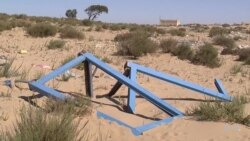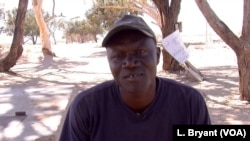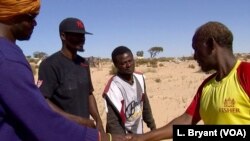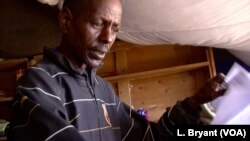Roland Margai Keller fled his native Liberia in 1996, as civil war was sputtering to an end, making his way through Ivory Coast and Nigeria before ending up in Libya.
But when Libya’s conflict erupted in 2011, he found himself running once again, joining a surge of people crossing the border into Tunisia and finding shelter at a desert refugee camp.
Now, Keller is again adrift. Three years ago, the U.N. Refugee Agency closed the camp that once sheltered up to 18,000 daily, as Libya’s initial crisis wound down. Some were granted refugee status; many others were repatriated.
But Keller and several dozen other African men have gone nowhere. They did not qualify for asylum and they refuse to go home. So they remain in limbo in the Tunisian desert, roughly 10 kilometers from the Libyan border, where scraps of blown garbage and their frayed homes serve as the only reminders of Choucha refugee camp.
“We need a solution, but we get a deaf ear,” Keller says. “We stay here waiting for the United Nations for solutions.”
Not legal refugees
UNHCR Senior Protection Officer for Tunisia Nabil Benbekhti says the Africans failed to meet refugee status. They now fall under the responsibility of Tunisia’s government.
“These people were offered the possibility in 2013 to be repatriated,” Benbekhti says, “so now they are in the position of foreigners on Tunisia’s territory.”
Even buried deep in the desert, Choucha’s migrants have managed to keep their cause alive, fed by the occasional media report and sympathetic activists. There is a website dedicated to them, along with a recently released French-speaking documentary. Last fall, a Paris museum also hosted a photo exhibit of the camp.
If nothing else, Choucha captures the broader, frustrated hopes of migrants escaping poverty or unrest who have failed in their dreams to reach Europe and other points West.
“One of their problems is psychological,” says Taher Cheniti, secretary-general of the Tunisian Red Crescent Society. “They don’t understand why their compatriots, their friends and cousins were accepted for asylum, but they didn’t have the same chance. So they continue this sit-in, hoping the position of governments will change.”
Dangerous area
A few Choucha residents have found work in the nearby town of Ben Guerdane, but many beg for food and water from drivers passing by. The zone has also become increasingly dangerous. In March, Islamic State militants crossed over from Tunisia to launch an attack on Ben Guerdane. During a recent visit, police stopped a reporter twice to check papers, once driving into the desert to do so for security reasons.
“We survive by the road here by the grace of God,” says Kadirl Abdou from Ghana, whose dreadlocks are tucked under a black cap.
Abdou claims he left his homeland because of ethnic violence. Like the others, his asylum petition has been rejected. Ghana today is considered a leading example of African democracy, although there have been ethnic clashes in the past.
“I’m just looking for relocation, for a safe third country,” he said.
Asked whether Tunisia might be that place, he shook his head. “I come from a British colony,” he says. “The West, that’s my colonial past.”
Choucha’s residents have been offered temporary housing about an hour’s drive away, the Red Crescent’s Cheniti says, but most have turned that option down.
“They refuse to have their situation regularized in Tunisia because their ambition is different,” he adds. “Their final destination is the Italian coast.”
But Anais Elbassil, who heads the Tunisian chapter of French NGO France Terre d’Asile says a few have applied for Tunisian working papers months ago, and are still waiting for an answer.
“The possibilities for those remaining in Choucha?” she asks. “There really aren’t very many."








